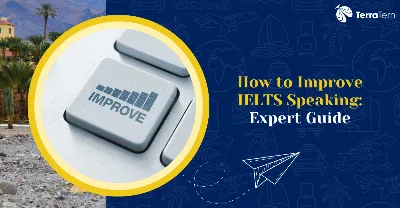Key Highlights
- Latest Facts, News & a Powerful Hook
- Understanding the IELTS Speaking Test Structure in 2025
- How To Improve Your IELTS Speaking At Home? Experts Guide 2025
- How To Improve Fluency In IELTS Speaking in 2025?
- How to Improve IELTS Speaking Score? Experts Tips and Guide 2025
- Experts Latest Advanced Tips for a Band 8 or 9 in IELTS Speaking
- Common Mistakes and How to Avoid Them in 2025
- Resources for IELTS Speaking Practice
- Conclusion
Wondering how to improve IELTS speaking? The IELTS Speaking exam in 2025 will be more focused on speaking in a fluent and coherent manner and having confidence. Having introduced new band descriptors at the end of the year 2024, candidates are also expected to prove that they can think and talk on the fly, not being able to answer solely based on their memory skills. Studies reveal that everyday speaking would lead to much higher scores, as well as recording oneself in a tape recorder and practising vocabulary that pertained to a topic. Mock tests, podcasts, and speaking applications are also free resources that have been important to test takers across the globe. The most important factors in achieving success are learning the format of the test and practising in a savvy manner, and how to improve your IELTS speaking at home, whether your aim is Band 7 or above. This text will equip you with reliable tips on succeeding and how to improve IELTS speaking!
Latest Facts, News & a Powerful Hook

-
In late 2024, IELTS Speaking band descriptors were changed, and this time they shifted towards factors of fluency and fluent coherence.
-
Readings published in the recent past depict that when candidates post-tape and analyse their speaking performance, they can advance their scores by an average of 20%.
-
IELTS trainers say practising with a speaking partner or online speaking group is helpful as these improve your confidence and fluency levels.
-
The British Council has currently provided free mock speaking tests online (online free mock speaking tests) to registered candidates.
-
IELTS is a part of the trends: podcasts and YouTube channels dedicated to this language test are becoming one of the most popular ways to prepare in 2025.
-
Not keeping to rehearsed answers and stressing instead on actual conversation is the critical grading standard now.
-
Lexical resource is higher for candidates who use topic-specific vocabularies and collocations.
-
The self-correction should only be advised in cases when one can correct his or her mistakes easily to end in fluent talks.
-
The world in 2024 has an average IELTS Band score of 6.5 in speaking, where the most challenging area was fluency.
-
It has been reported by many test-takers that the simulation of exam-type products in terms of both time worked and the related anxiety is substantially mitigated.
Are you ready to learn how to improve IELTS speaking? Get the most useful expert-certified methods, practical advice, and insider knowledge that are already being used by thousands of candidates to score Band 7+ in 2025. It is not enough to practice; you have to practice smart. Let’s learn more about how to improve IELTS speaking and how to improve your IELTS speaking at home!
Understanding the IELTS Speaking Test Structure in 2025
When the question is asked how to improve IELTS speaking, you should know to improve your IELTS Speaking score, you must first understand the test’s structure and what each part demands. Each section, Parts 1, 2, and 3, assesses different speaking skills. Knowing the timing, question types, and examiner expectations will help you prepare strategically and perform confidently on test day.
Test Format Overview
Here is an overview of the test format for you to understand better how to improve IELTS speaking:
|
Part |
Duration |
Format |
Assessment Focus |
|
Part 1 |
4-5 minutes |
Introduction and familiar topics |
Fluency, basic vocabulary, and personal experience |
|
Part 2 |
3-4 minutes |
Individual long turn (2-minute speech) |
Coherence, lexical resource, sustained speech |
|
Part 3 |
4-5 minutes |
Two-way discussion |
Complex ideas, analytical thinking, and advanced vocabulary |
What Examiners Look For?
The four important criteria that will help your understand how to improve IELTS speaking know what is considered by the examiners in evaluating your performance are:
-
Fluency and Coherence: This is the skill to speak without too many long pauses in between, be logical, use the words and phrases that help to connect the ideas respectfully, so it does not sound like choppy thinking.
-
Lexical Resource: The depth and precision of your vocabulary, and how you correctly use your less frequent words, collocations, and expressions in a piece of writing
-
Grammatical Range and Accuracy: The range and accuracy of your usage of different grammatical patterns, from basic to simple and from complex to complex, and your capability of applying grasped grammar rules while maintaining normal phrasing and word order
-
Pronunciation: Your ability to articulate clearly and intelligibly speech with due sounds of stress, intonation, and rhythm, which would not hamper the process of communication
Also Read: IELTS Band Score Table: New Academic & Listening Guide
How To Improve Your IELTS Speaking At Home? Experts Guide 2025

Wonder how to improve IELTS speaking at home? Designing a great practice space is the key to your success. Find a soundproof place that is well-lit and without noise where you can talk loudly without any hindrance. Make sure that you take with you:
-
Recording Gear: Memorise and store on your smartphone or computer something that you practice so that, after going through it objectively, you can review and analyse your performance
-
Mirror Practice: A mirror should be placed in front of you to monitor your facial expressions and body language, to get rid of unnatural and not very confident speech habits
-
Timer and Clock: study under timed conditions to simulate the conditions of a real test and learn to pace yourself in each test section
-
Convenient Sitting: Dress the sitting to a simulated test experience, sit in a position facing a person taking an examination
Using Technology for Practice
There is a wide range of modern technology that would help you to prepare for your IELTS speaking:
-
IELTS Speaking Apps: Use applications, such as IELTS Prep App, Magoosh IELTS, or IELTS Speaking Assistant, which allow you to take a mock test, offer some sample questions, and review your answers automatically
-
YouTube Channels: To get professional suggestions as well as sample responses and practice exercises, follow such channels as IELTS Liz, E2 IELTS, or IELTS Simon, as the channel administrators change them regularly to reflect popular topics
-
Online Simulators: Resort to such sites as Road to IELTS or preparation exercises provided by IDP, which provide a realistic simulation of a test with a computer-based feedback system
-
Language Exchange: Language exchange: Find native speakers on HelloTalk, Tandem, or Conversation Exchange to practise real conversation and get genuine feedback
How To Improve Fluency In IELTS Speaking in 2025?
If you’re wondering how to improve fluency in IELTS speaking, fluency is a skill that defines how you can flow and speak without much reluctance. It is one of the most difficult parts for many candidates that can be greatly improved with special practice. Let’s learn more on how to improve IELTS speaking!
Techniques to Boost Fluency
The creation of fluency needs hard work on certain methodological patterns:
-
Shadowing: You can use podcasts or news shows, as well as IELTS practice, and simply repeat what you hear in sync, at the same speed, intonation, and rhythm
-
Timed Speaking: This is similar to speaking practice, but using a period; you stand and talk continuously on topics chosen by the timer, and increase the time with increasing confidence
-
Topic Familiarisation: Have a daily 1-2 minutes of practice talking about everyday IELTS topics, such as education, technology, environment, and culture, to get familiar with topic-specific vocabulary and become more confident
-
Thinking in English: Learn to think in English, not converting it to your native language. Do it all the time. This helps you become much less hesitant, and you create more natural phrases, and thus you sound more fluent
Barriers to Fluency and Ways to Work Around Them
How to improve fluency in IELTS speaking? There are several challenges that block the fluency of many candidates:
-
Test Anxiety: Before engaging in speaking tasks, learn to relax, practice positive visualisation as well as deep breathing to reduce anxiety during the actual test time
-
Natural Fillers: Learn to use the right fillers, where you can use the terms as natural, namely, well, actually, you know, but not discuss it all the time with the specific fillers, trying to impress the examiners
-
Self-Correction Measures: Practice correcting mistakes at speed without breaking your flow, just on errors that affect meaning too much
How to Improve IELTS Speaking Score? Experts Tips and Guide 2025

The big question is how to improve IELTS speaking and how to improve IELTS speaking score. To maximise your score in the IELTS Speaking exam, it is important to know how to cover every criterion of testing in an orderly manner. Concentrate on overall enhancement within the marking criteria as opposed to being exceptional in one of the four areas of marking. Let's learn how to improve IELTS speaking score!
The Knowledge of Marking Criteria
Band points of every criterion are equally combined with the rest to get the final band score:
-
Improvement of Fluency and Coherence: Speak continuously without pausing, employ discourse markers, and remain logically coherent in your speaking
-
Lexical Resource Development: Designed to this end is the expansion of your vocabulary by reading as large quantities of materials as possible, studying collocations and phrasal verbs, and employing the collocations to prevent monotony in an answer
-
Grammatical Range Development: Learn to use and master different kinds of sentences, such as complex sentences, conditional sentences, and passive voice as well while preserving the simplicity of basic grammar
-
Pronunciation Correction: Focus on the isolated sounds that are difficult in your first language, study word stress, and learn to correct the intonation and rhythm on the sentence level
Self-Assessment and Feedback
Regular evaluation of your progress is essential for continuous improvement:
-
Recording Analysis: Record yourself weekly answering practice questions, then analyse your performance using the official band descriptors to identify specific areas for improvement
-
Peer Feedback: Join online study groups or find study partners to exchange feedback on speaking practice, providing mutual support, and different perspectives on performance
-
Professional Evaluation: Consider occasional sessions with qualified IELTS tutors who can provide expert feedback and personalized strategies for your specific challenges
-
Progress Tracking: Maintain a practice journal documenting your daily speaking activities, noting improvements and areas requiring additional focus
Experts Latest Advanced Tips for a Band 8 or 9 in IELTS Speaking

How to improve IELTS speaking? Achieving the highest band scores requires sophisticated language use and natural communication skills that go beyond basic fluency and accuracy.
Sophisticated Language Use
High-scoring candidates demonstrate advanced linguistic competence:
-
Idiomatic Expressions: Incorporate natural idioms and colloquialisms appropriately, such as "it's a double-edged sword" or "that's food for thought," ensuring they fit the context naturally
-
Complex Grammatical Structures: Use advanced structures like cleft sentences ("What I find particularly interesting is..."), inversion ("Not only does this affect... but it also..."), and sophisticated conditional forms
-
Precise Vocabulary: Choose specific, nuanced words over general ones, such as "scrutinize" instead of "look at" or "mitigate" instead of "reduce," demonstrating lexical sophistication
-
Discourse Management: Master advanced linking devices and cohesive features that create seamless flow between ideas, showing sophisticated understanding of text organization
Strategic Response Development
High-band candidates structure their responses strategically:
-
Extended Responses: Develop ideas fully with supporting details, examples, and explanations that demonstrate depth of thought and linguistic ability
-
Critical Thinking: Show ability to analyse, evaluate, and synthesise information, presenting balanced arguments and considering multiple perspectives on complex issues
-
Cultural Awareness: Demonstrate understanding of cultural nuances and global perspectives while maintaining respect for diverse viewpoints and practices
-
Spontaneous Elaboration: Extend responses naturally beyond the basic requirements, showing ability to think quickly and express complex ideas fluently.
Also Read: IELTS Speaking Band Descriptors: Expert Tips & Updates
Common Mistakes and How to Avoid Them in 2025
When you ask the question, How to improve IELTS speaking, understanding frequent pitfalls helps you avoid score-limiting errors that many candidates make unknowingly.
Critical Errors to Avoid
Here are some critical errors to avoid to understand how to improve IELTS speaking:
-
Memorised Responses: Avoid rehearsed answers that sound unnatural and don't directly address the question asked, as examiners can easily identify and penalise this approach
-
Overuse of Fillers: While some hesitation is natural, excessive use of "um," "uh," or "like" can significantly impact your fluency score and create a negative impression
-
Ignoring Pronunciation: Neglecting clear articulation, appropriate stress patterns, and natural intonation can severely limit your score, even if your vocabulary and grammar are strong
-
Incomplete Responses: Failing to fully address all parts of multi-part questions or providing superficial answers that don't demonstrate your true language ability
-
Inappropriate Register: Using overly formal or informal language inappropriately for the context, showing a lack of awareness of situational language requirements
Prevention Strategies
Here are some prevention strategies you can use to understand how to improve IELTS speaking:
-
Question Analysis: Practice identifying all components of complex questions and ensure you address each part thoroughly in your response
-
Natural Conversation Practice: Engage in regular conversations with native speakers or advanced learners to develop natural speech patterns and appropriate language use
-
Pronunciation Focus: Work systematically on problematic sounds, practice reading aloud regularly, and use pronunciation apps or tools for targeted improvement
-
Response Structure: Develop templates for organising your thoughts quickly while maintaining natural, spontaneous-sounding delivery
Resources for IELTS Speaking Practice

Understanding how to improve IELTS speaking and to finally excel in the IELTS Speaking test, having the right practice resources is just as important as knowing the format. From interactive apps and expert-led YouTube channels to curated books and online mock tests, the following tools will help you sharpen your skills and build confidence for test day. Let’s learn more on how to improve IELTS speaking!
Recommended Digital Resources
Here is a breakdown of the recommended digital resources:
|
Resource Type |
Specific Tools |
Key Benefits |
|
Mobile Apps |
IELTS Prep App, Magoosh IELTS |
Convenient practice, automated feedback, and progress tracking |
|
YouTube Channels |
IELTS Liz, E2 IELTS, IELTS Simon |
Expert tips, sample answers, and current topics |
|
Online Platforms |
Road to IELTS, IDP Education |
Official materials, realistic simulations, and comprehensive practice |
|
Language Exchange |
HelloTalk, Tandem, Conversation Exchange |
Real conversation practice, cultural exchange, and feedback |
Traditional Study Materials
Here is a list of traditional materials:
-
Official Cambridge IELTS Books: Provide authentic test materials and sample answers with examiner commentary, offering insight into scoring standards
-
Pronunciation Guides: Use resources like "English Pronunciation in Use" or "Ship or Sheep" to work systematically on sound discrimination and production
-
Vocabulary Builders: Utilise books like "Vocabulary in Use" or "Collocations in Use" to expand your lexical range with topic-specific terminology
-
Grammar References: Consult comprehensive grammar books like "English Grammar in Use" to master complex structures and ensure accuracy
Practice Communities
Here is a list of practice communities:
-
Online Forums: Join IELTS preparation groups on Reddit, Facebook, or dedicated IELTS forums to share experiences, tips, and practice opportunities
-
Local Study Groups: Connect with other candidates in your area through language schools, libraries, or community centres for regular speaking practice
-
Virtual Study Partnerships: Find study partners through online platforms for regular speaking practice sessions and mutual feedback
-
Professional Tutoring: Consider working with qualified IELTS instructors for personalised feedback and targeted improvement strategies
Also Read: IELTS Speaking Topics: Trends, Tips & Sample Answers
Conclusion
Understanding how to improve IELTS speaking? Mastering the IELTS Speaking section in 2025 requires more than just practice; it demands smart, targeted preparation. With updated band descriptors emphasising fluency, coherence, and natural conversation, it’s essential to build real communication skills. Use modern tools, practice with intention, and focus on examiner expectations. Whether you're aiming for Band 7 or Band 9, daily improvement through structured routines, feedback, and self-assessment will get you there. Avoid memorised responses, embrace spontaneity, and let your personality shine. With the right strategy and consistent effort, your dream score is absolutely within reach. Speak confidently, speak clearly, and success will follow. To learn more, visit TerraTern!






